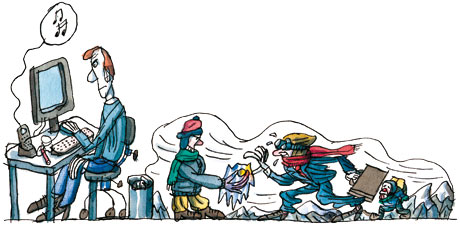
I am aware that my line of work presents very little in the way of occupational hazard: no heights, no molten metal, no dangerous fumes, 60ft waves, burning warehouses or kids chucking rocks at my ambulance. There are no diseases named after my profession. I have nothing to complain about when I get home from a hard day's work, because I do not work hard, and I am already home.
It was with some shame, then, that I finally typed the words "cold mouse hand" into Google. By this time I had already suffered with the condition for several weeks: when working at my computer for any length of time, I find that the hand holding the mouse goes cold. It does not go numb, tingle or ache; rather, it becomes suffused with an unholy chill, as if my body were in the process of rejecting a donor hand.
The search term "cold mouse hand" produces just over 11 million hits, but I do not draw much comfort from the realisation that I am not alone. Instead, I feel as if I've been indoctrinated into a brotherhood of whiners and alarmists. I read about Raynaud's phenomenon and Finkelstein's test for De Quervain's syndrome. I am directed to sites where you can buy heated mouse pads. I'm repeatedly advised to consult my GP, but I am not going to book an appointment to tell a doctor that my hand gets cold sometimes. In fact, I'm not going to tell anyone.
"There's something weird going on with my hand," I say to my wife that evening.
"That's interesting," says my wife. "Would you like to hear about my day? I've been to work, picked up the kids, gone shopping, cleared up, cooked a meal, cleared up again, and now I'm cooking another meal."
"It's like it's not even my hand," I say.
My solution, for now, is to work the mouse with my other hand. This is awkward, distracting and inconvenient. When the phone rings, for example, I find I cannot reach it without letting go of the mouse.
"Hello?" I say. A man with a deep voice asks to speak with me. I employ my standard office hours response: "He's not here," I say.
"When will he be back?" the man asks. This is perhaps my only other occupational hazard: the suffocating attentions of cold-callers.
"Later," I say.
"I've been trying to contact him for a while," the man says. "We seem to keep missing each other."
No, we are not missing each other, I think. I'm avoiding you, whoever you are. "Uh-huh," I say.
"Are you able to take a message for him?" he says. He tells me his name is Steve. He wants me to invest in a film, an absurd proposition that is vaguely familiar from several past calls and messages. He explains the tax advantages in some detail, and mentions the provisional start date for principal photography. I realise I'm actually writing all this down.
"OK," I say. "I'll see he gets it."
"Can I take your name?" he says.
There is a long pause at my end. "My name is Ron," I say.
"Ron," he says, his voice icy with incredulity.
"Ron," I say. "R-o-n." I hear a faint, derisory snort. What's so implausible about my unhelpful assistant Ron?
"And what's a good time to call back, Ron?" he says. "Will he be in after lunch, do you think?"
"No," I say. "Not until four."
At 4.30pm the phone rings again, and I think: I don't want to invest in your film, Steve, but you are never going to find that out, because we are never going to have a conversation in which I play myself. Your persistence must be punished. If I had a penny, I wouldn't give it to you, Steve. You'd have to pry it from my cold mouse hand.

